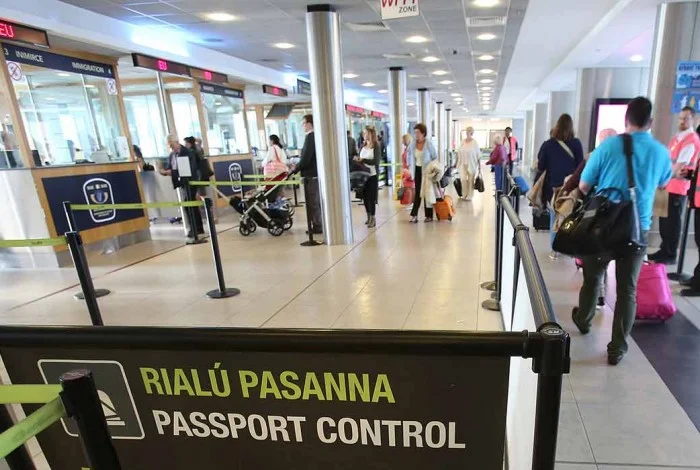Helpful Tips
Useful Tips » Customs Control
Immigration Control: how to avoid a bad experience

Immigration control, upon arrival at your destination, is often one of the most stressful moments of the trip for many travelers. At this stage, authorities verify the traveler’s identity and ensure that entry into the country complies with current legal requirements. Depending on the country, the traveler’s nationality, and the migration context, controls may be more or less strict.
At many airports, the process includes biometric controls, such as facial recognition and/or fingerprint collection, in addition to passport scanning. These procedures are common and form part of standard international border controls.
Tips
- Before traveling, make sure you have all the documentation required by your destination country. In most cases, your passport must be valid for the entire stay, and many countries also require a remaining validity of 6 months at the time of entry, regardless of your return date. Also check whether you need a visa, vaccination certificates, or mandatory immigration or health forms.
- Complete required forms in advance. Some must be completed online before departure, while others can be filled out during the flight or upon arrival. At certain airports, immigration control begins at automated kiosks where passports are scanned and biometric data is recorded.

- Keep essential information readily available, either digitally or printed: passport, accommodation address, reservations, basic itinerary, and contact details. Being able to present this information immediately often speeds up the process.
- During your interaction with immigration officers, remain calm and answer clearly. Excessive nervousness, contradictory answers, or evasive behavior may raise doubts and lead to additional questions.
- Do not answer questions you do not understand. If there is a language barrier or an instruction is unclear, ask for clarification before responding or signing any document.
- Answer only what you are asked. Providing unnecessary information or changing your story during the interview is a common mistake and may result in additional screening.
- Never lie. Immigration authorities use verification systems and databases. False information may result in delays, more extensive checks, or denial of entry.
- Avoid jokes or ironic comments. Immigration control is a formal procedure, and any statement may be taken literally.
- Do not take photos or record videos. Immigration areas usually have strict rules regarding photography and mobile phone use.
What are you usually asked?

If the traveler does not hold nationality or residency in the destination country, it is common for immigration officers to ask basic questions. In countries with high levels of irregular immigration, controls may be more detailed.
What is the purpose of your visit?
Answer briefly and consistently with your documentation: tourism, visiting family or friends, studies, or work.
Declaring “work” or “studies” as the purpose of travel usually requires the appropriate visa and supporting documentation. Stating your regular occupation does not mean that you are going to work in the destination country.
Avoid ambiguous expressions such as “tourism and maybe looking for a job,” as this can cause problems without work authorization.
What do you do for a living?
It is common for immigration officers to ask about the traveler’s occupation. Explaining what you do professionally does not imply that you will work in the destination country.
If you work remotely for a company or clients based abroad, make it clear that your activity is not related to the local labor market and does not involve employment within the country you are visiting.
Where will you stay?
Accommodation may be a hotel, a temporary rental (such as Airbnb or similar options), or the home of a family member or acquaintance.
For hotels or short-term rentals, it is advisable to have a confirmed reservation and be able to show it on your phone or in printed form if requested. If staying with a resident, have the full name, address, and a contact number of your host.
How long will you stay?
The declared length of stay must be consistent with the applicable visa or entry regime. Never state a period longer than what is authorized.
Do you have a ticket to leave the country?
In many destinations, immigration officers may request proof of onward or return travel, such as a return flight or a ticket to continue your journey, including land or sea transportation. This document demonstrates your intention to leave the country within the permitted timeframe.
What financial means do you have for your stay?
Some countries require travelers to demonstrate sufficient financial means for the declared stay. This may be shown through cash, international credit or debit cards, and in some cases additional documentation.
Many countries set limits for undeclared cash entry, often around USD 10,000 or its equivalent, depending on the country. Always check the specific regulations before traveling.
Do you have medical or travel insurance?
Having travel insurance is highly recommended, even when it is not mandatory. In some destinations or immigration regimes, minimum medical coverage is required for entry.
How to answer during immigration control
Answers should be brief, clear, and consistent with the documentation presented. The key is consistency between the purpose of travel, length of stay, accommodation, exit ticket, and financial means. There is no need to justify beyond what is asked.
Situations that may occur
Why might you be referred to secondary inspection?
Being referred to secondary inspection is more common than many travelers expect and does not necessarily indicate a problem. It may result from random checks, additional system verifications, matches in personal data, or the need to confirm information or documentation.
In most cases, after additional verification, the traveler is allowed to proceed. It is important to remain calm, follow instructions, and wait without arguing or becoming distressed.
If traveling with minors, check in advance whether additional documentation, such as travel authorizations, is required, as some countries demand these documents for entry, exit, or transit.
